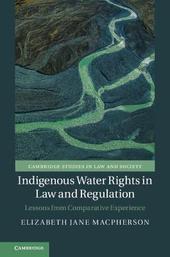
|
Indigenous Water Rights in Law and Regulation: Lessons from Comparative Experience
Hardback
Main Details
| Title |
Indigenous Water Rights in Law and Regulation: Lessons from Comparative Experience
|
| Authors and Contributors |
By (author) Elizabeth Jane Macpherson
|
| Series | Cambridge Studies in Law and Society |
|---|
| Physical Properties |
| Format:Hardback | | Pages:310 | | Dimensions(mm): Height 235,Width 157 |
|
| ISBN/Barcode |
9781108473064
|
| Classifications | Dewey:346.0432 |
|---|
| Audience | | Professional & Vocational | |
|---|
| Illustrations |
Worked examples or Exercises
|
|
Publishing Details |
| Publisher |
Cambridge University Press
|
| Imprint |
Cambridge University Press
|
| Publication Date |
8 August 2019 |
| Publication Country |
United Kingdom
|
Description
Indigenous Water Rights in Law and Regulation responds to an unresolved question in legal scholarship: how are (or how might be) indigenous peoples' rights included in contemporary regulatory regimes for water. This book considers that question in the context of two key trajectories of comparative water law and policy. First, the tendency to 'commoditise' the natural environment and use private property rights and market mechanisms in water regulation. Second, the tendency of domestic and international courts and legislatures to devise new legal mechanisms for the management and governance of water resources, in particular 'legal person' models. This book adopts a comparative research method to explore opportunities for accommodating indigenous peoples' rights in contemporary water regulation, with country studies in Australia, Aotearoa New Zealand, Chile and Colombia, providing much needed attention to the role of rights and regulation in determining indigenous access to, and involvement with, water in comparative law.
Author Biography
Elizabeth Jane Macpherson is a Senior Lecturer at the University of Canterbury, Christchurch, New Zealand. She researches comparative Australasian and Latin American natural resources law and indigenous rights. Her legal practice experience includes representing claimants before New Zealand's Waitangi Tribunal and the Victorian State Government on Aboriginal Affairs.
Reviews'Macpherson's book is a work of outstanding scholarship, drawing on a deep understanding of water law and indigenous rights in Chile, Colombia, Australia, and Aotearoa New Zealand to develop a new model for understanding and articulating indigenous water rights in the context of indigenous peoples' enduring culture, law, and relationship to Country. Her book provides a much-needed reminder that water management in post-colonial societies exists within a history of indigenous dispossession, as well as an all-too-frequently continued exclusion from water allocation frameworks. ... This book is a must-read for all scholars and practitioners of water law and water resource management - it challenges us to acknowledge the inequity and unsustainability of existing water law frameworks, and presents new and powerful lessons on how to deliver water justice for indigenous peoples, and the environment which sustains all of us.' Erin O'Donnell, University of Melbourne 'This is a completely compelling comparative study that confidently addresses the ongoing injustice in the distribution of water use rights. As countries around the world embark on reconciliation aspirations, this book is a must-read for us all in considering how to recognise indigenous peoples' rights to be included in contemporary regulatory regimes for water. This book is a sophisticated offering to a complex issue that deserves the highest and widest regard.' Jacinta Ruru, University of Otago, and Co-Director, Nga Pae o te Maramatanga, New Zealand's Maori Centre of Research Excellence '[...] a highly relevant book, contributing to the debates about rights of nature in general, and legal personhood for rivers more specifically. The case studies [...] are well chosen. Macpherson's use and comparison of case studies of countries where water rights have been historically denied to indigenous groups show the need for approaches that move beyond repairing historical injustices by narrowly defined 'traditional' water uses in a generally constraining context. Ongoing injustices can only be effectively tackled by creating indigenous jurisdictions for water governance and effecting a substantive (re-)distribution of water for multiple purposes, including socio-economic development.' Dik Roth, The Journal of Legal Pluralism and Unofficial Law
|